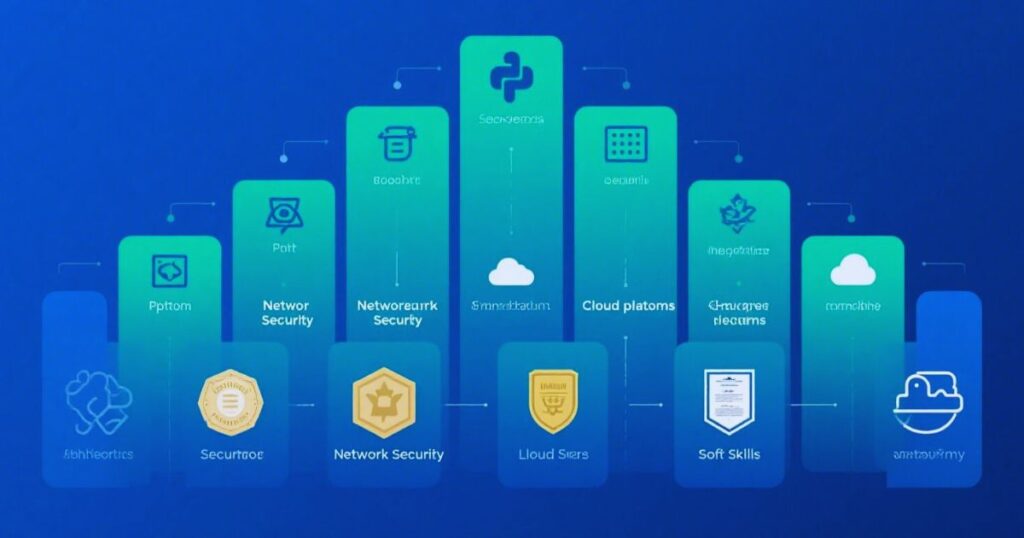Introduction
Cybersecurity internship remote opportunities are changing careers for Nigerian graduates. Cyber security internships remote programs offer global exposure that local positions cannot match. Did you know that Nigerian cybersecurity professionals make up 40% of Africa’s tech security workforce, yet only 3% have accessed international remote internships?
The global cybersecurity talent shortage creates massive opportunities. Companies worldwide need skilled professionals to protect their digital assets. Remote internships bridge this gap perfectly.
Nigerian graduates gain access to Fortune 500 companies through these programs. They work with cutting-edge technology and learn from industry leaders. The experience transforms their career prospects completely.
These opportunities remain rare because of strict security requirements. Companies must verify candidates thoroughly before granting access. Time zone coordination and technical infrastructure add complexity.
This article reveals how to find and secure these positions. You will learn essential skills, application strategies, and success stories. We cover common challenges and practical solutions for Nigerian applicants.
Remote internships represent the future of cybersecurity training. They offer higher salaries, better mentorship, and global networking opportunities. Smart graduates position themselves for these roles now.
What Makes a Cybersecurity Internship Remote So Rare?
The Exceptional Opportunities in Cybersecurity Internship Remote Programs
Cybersecurity internship remote positions provide unmatched learning experiences. Interns work on real Fortune 500 company projects from day one. They handle sensitive data and critical security incidents.
Global industry leaders mentor these remote interns directly. Weekly one-on-one sessions help develop advanced skills quickly. Mentors share decades of experience and industry insights.
Cutting-edge technology exposure sets these programs apart. Interns use enterprise-grade security tools worth thousands of dollars. They access cloud platforms, AI security systems, and advanced threat detection software.
International network building accelerates career growth. Interns connect with professionals across different continents. These connections lead to future job opportunities and collaborations.
The hands-on experience rivals full-time positions. Interns contribute to actual security assessments and incident responses. Their work directly impacts company’s security posture.
Companies invest heavily in remote intern training programs. They provide structured learning paths and certification support. This investment ensures interns develop marketable skills.
Why Companies Hesitate to Offer Cybersecurity Internship Remote Positions
Security clearance concerns limit many opportunities. Companies worry about data breaches and unauthorized access. Background verification becomes more complex for international candidates.
Trust and verification challenges slow the hiring process. Employers struggle to verify skills and credentials remotely. Video interviews cannot fully assess technical competency.
Time zone coordination creates operational difficulties. Real-time collaboration becomes challenging across continents. Meeting schedules must accommodate multiple time zones.
Technical infrastructure requirements increase program costs. Companies must provide secure remote access tools. VPN licenses, monitoring software, and hardware add expenses.
Legal compliance issues complicate international hiring. Data protection laws vary across countries. Companies must navigate complex regulatory requirements.
Cultural differences affect communication and collaboration. Remote work requires clear communication protocols. Misunderstandings can impact project outcomes.
Read Also: 7 Mistakes to Avoid in a Cover Letter for an Internship
Cybersecurity Internship Remote vs. Local Nigerian Opportunities
Comparing Salaries and Benefits
Local internship positions typically pay ₦30,000-₦80,000 monthly. These amounts barely cover basic living expenses. Most local internships offer limited learning opportunities.

Cybersecurity internship remote positions pay $500-$2,000 monthly. This represents a 300-500% salary increase over local options. Payment arrives in stable foreign currency.
Additional benefits include free certification training. Companies cover exam fees for industry certifications. Some programs provide laptop and internet allowances.
Remote positions offer flexible working arrangements. Interns can work from anywhere with reliable internet. This flexibility reduces commuting costs and time.
Health insurance and wellness programs accompany some positions. Mental health support and fitness allowances improve work-life balance. These benefits are rare in local internships.
Professional development budgets support continuous learning. Companies allocate funds for courses and conference attendance. This investment accelerates skill development.
Career Growth Trajectories
Local market limitations restrict career advancement. Nigerian cybersecurity roles often require years of experience. Entry-level positions offer minimal growth opportunities.
International career pathways open through remote internships. Graduates can transition to full-time remote roles. Some receive offers from multiple companies.
Real case studies demonstrate impressive success stories. Adebayo from Lagos secured a $80,000 full-time role. His cybersecurity internship remote experience with a US fintech company opened doors.
Kemi from Abuja landed a position at a European bank. Her remote internship portfolio impressed international recruiters. She now leads a team of five security analysts.
Tunde from Ibadan founded his own cybersecurity consulting firm. His remote internship network provided initial clients. The business now generates $200,000 annually.
What is a cybersecurity internship remote? A cybersecurity internship remote is a virtual training program where students gain hands-on experience in information security, working with international teams to protect digital assets while developing professional skills from anywhere.
Essential Skills for Landing a Cybersecurity Internship Remote

Technical Skills Every Cybersecurity Internship Remote Requires
Network security fundamentals form the foundation of cybersecurity knowledge. Understanding TCP/IP, firewalls, and VPNs is essential. These concepts appear in every security role.
Basic programming skills in Python and JavaScript are crucial. Python handles automation and security scripting tasks. JavaScript knowledge helps with web application security testing.
Security tools proficiency demonstrates practical capabilities. Wireshark for network analysis, Metasploit for penetration testing, and Nmap for network scanning. These tools appear in daily security operations.
Cloud security basics become increasingly important. AWS and Azure dominate enterprise cloud environments. Understanding cloud security models and best practices is essential.
Risk assessment and compliance knowledge adds value. Frameworks like NIST and ISO 27001 guide security programs. Interns must understand these standards.
Incident response procedures require structured approaches. Knowing how to contain, investigate, and remediate security incidents. Documentation and communication skills are equally important.
Soft Skills That Set You Apart
Communication across cultures requires sensitivity and clarity. Remote teams include members from different backgrounds. Clear, respectful communication prevents misunderstandings.
Time management and self-discipline determine remote work success. Without supervision, interns must stay productive. Setting schedules and meeting deadlines is crucial.
Problem-solving mindset approaches challenges systematically. Cybersecurity involves complex, evolving threats. Creative thinking and persistence solve difficult problems.
Professional English proficiency enables effective collaboration. Technical documentation and presentations require clear language. Grammar and vocabulary mistakes can impact credibility.
Adaptability helps navigate changing requirements. Technology and threats evolve constantly. Successful interns embrace change and learn continuously.
Team collaboration skills matter even in remote settings. Virtual teamwork requires different approaches than in-person collaboration. Building trust and rapport through digital channels is essential.
Free Certifications Accessible to Nigerians
Google Cybersecurity Certificate provides industry-recognized credentials. The program covers security fundamentals and hands-on skills. Coursera offers financial aid for Nigerian students.
Cisco’s CyberOps Associate certification validates SOC analyst skills. The training covers security monitoring and incident response. Cisco Networking Academy provides free access.
CompTIA Security+ through self-study offers entry-level certification. Online resources and practice exams are freely available. This certification opens many doors.
ISACA Cybersecurity Fundamentals introduces governance and risk management. The certification covers business aspects of cybersecurity. Student discounts make it affordable.
Microsoft Security, Compliance, and Identity Fundamentals is free. The certification covers cloud security basics. Microsoft Learn provides comprehensive training materials.
EC-Council Computer Hacking Forensic Investigator Associate is accessible. The entry-level version covers digital forensics fundamentals. Online training materials are freely available.
Read Also: 8 Essential Skills You Need Before an Internship in 2025
Building Your Portfolio for Cybersecurity Internship Remote Applications
GitHub Projects That Impress Recruiters
Security audit tools showcase programming and security skills. Create scripts that scan for common vulnerabilities. Document your code clearly with usage examples.
Vulnerability scanners demonstrate practical security knowledge. Build tools that identify specific security weaknesses. Include test cases and remediation recommendations.
Password managers show understanding of cryptography and security. Implement secure storage and encryption protocols. Document security design decisions thoroughly.
Network monitoring scripts reveal operational security skills. Create tools that detect unusual network activity. Include alert mechanisms and reporting features.
Bug bounty participation evidence proves real-world experience. Document discovered vulnerabilities and responsible disclosure. Include screenshots and detailed reports.
Penetration testing tools demonstrate ethical hacking skills. Create automated testing frameworks for common vulnerabilities. Include detailed documentation and usage guidelines.
Creating a Standout Digital Presence
LinkedIn optimization attracts recruiter attention. Use cybersecurity internship remote keywords in your headline. Share security articles and comment on industry posts.
Personal security blog benefits showcase expertise and communication skills. Write about security topics you are passionate about. Share practical tips and analysis.
Contributing to open-source security projects builds credibility. Submit bug fixes and feature improvements. Engage with project communities professionally.
Building a professional Twitter presence expands your network. Follow security experts and engage in discussions. Share interesting security news and insights.
Creating video content demonstrates communication skills. Record tutorials or security concept explanations. YouTube and LinkedIn video content performs well.
Participating in security conferences and webinars shows commitment. Attend virtual events and engage with speakers. Share key takeaways on social media.
Where to Find Cybersecurity Internship Remote Opportunities
Top Platforms for Cybersecurity Internship Remote Positions
AngelList connects you with startup opportunities. Early-stage companies often offer remote internships. Equity participation can provide long-term benefits.
RemoteOK aggregates global remote positions. Filter by cybersecurity and internship categories. New opportunities appear daily on the platform.
We Work Remotely features established companies. Large corporations post cybersecurity internship remote positions here. Application processes are more structured.
LinkedIn offers direct applications to hiring managers. Use advanced search filters for remote internships. Connect with cybersecurity professionals for referrals.
Handshake provides university partnerships. Many international universities post opportunities. Nigerian students can access these through partner institutions.
Indeed Remote filters searches effectively. Use specific keywords like “cybersecurity internship remote” in searches. Set up job alerts for new postings.
CyberSeek specializes in cybersecurity opportunities. The platform focuses exclusively on security roles. Government and private sector positions are available.
Companies Actively Hiring Nigerian Talent
Cloudflare regularly hires remote interns globally. Their security team includes Nigerian professionals. The application process is straightforward and merit-based.
Rapid7 offers cyber security internships remote opportunities. They value diverse perspectives and backgrounds. The company provides comprehensive training programs.
CrowdStrike seeks talented individuals regardless of location. Their remote internship program is highly competitive. Success rates improve with strong technical portfolios.
Palo Alto Networks has expanded remote hiring. They offer structured mentorship programs. Technical assessments focus on practical skills.
Okta provides identity security internships. The company embraces remote work culture. They offer competitive compensation and benefits.
Darktrace uses AI for cybersecurity solutions. They seek interns with programming skills. The company provides cutting-edge technology exposure.
Overcoming Nigerian-Specific Challenges in Cybersecurity Internship Remote
Solving Power and Internet Reliability Issues
Backup power solutions ensure consistent availability. Inverters cost ₦50,000-₦150,000 depending on capacity. Solar panels provide long-term power security.
Internet redundancy strategies prevent connectivity issues. Subscribe to multiple ISPs for failover capability. Mobile data plans serve as backup connections.
Co-working spaces in major Nigerian cities offer reliable infrastructure. Lagos, Abuja, and Port Harcourt have excellent facilities. Monthly memberships cost ₦30,000-₦80,000.
Mobile data as backup connection requires unlimited plans. MTN, Airtel, and Glo offer competitive packages. 4G coverage is reliable in urban areas.
Starlink satellite internet provides premium connectivity. Installation costs around ₦400,000 with monthly fees. The service offers consistent speeds and reliability.
UPS systems protect equipment from power fluctuations. Invest in quality surge protectors and voltage regulators. Equipment protection prevents costly repairs.
Managing Time Zones in Cybersecurity Internship Remote Work
Tools for scheduling across time zones simplify coordination. Calendly and World Clock Pro help schedule meetings. Always confirm meeting times in multiple zones.
Communicating availability effectively prevents conflicts. Share your working hours in company time zones. Use calendar blocking to show availability.
Balancing US/EU work hours requires flexibility. Some overlap with Western business hours is expected. Negotiate core collaboration hours during interviews.
Productivity tips for odd hours maintain work quality. Establish consistent sleep schedules despite unusual hours. Use productivity apps to track tasks.
Energy management becomes crucial for odd-hour work. Plan high-concentration tasks during peak energy periods. Take breaks to prevent burnout.
Creating boundaries between work and personal time prevents exhaustion. Set specific start and end times. Communicate these boundaries to team members.
Payment Solutions for Nigerian Remote Workers
Payoneer setup process takes 2-3 weeks for approval. Fees range from 2-3% per transaction. The service supports multiple currencies.
Wise (formerly TransferWise) offers competitive exchange rates. Setup requires identity verification and address proof. Fees are transparent and reasonable.
Cryptocurrency options like USDT and USDC provide alternatives. Binance and Quidax support Nigerian users. Volatility remains a consideration.
Domiciliary accounts work best with GTBank and Zenith Bank. These banks support international wire transfers. Fees vary by transaction amount.
Tax implications require professional advice. Consult tax experts for international income reporting. Keep detailed records of all payments.
Documentation requirements include contracts and payment records. Maintain organized files for tax purposes. Bank statements provide payment proof.
Read Also: 10 Virtual Internship Secrets You Must Know
The Application Process for Cybersecurity Internship Remote Positions
Step-by-Step Application Strategy
Resume optimization for ATS systems requires keyword integration. Include cybersecurity internship remote terms naturally. Use standard formatting without graphics.
Cover letter templates that work address specific requirements. Customize each letter for the target company. Highlight relevant projects and skills.
Portfolio presentation tips showcase your best work. Create a clean, professional website. Include project descriptions and technical details.
Interview preparation covers technical and behavioral questions. Practice common cybersecurity scenarios. Prepare stories demonstrating problem-solving skills.
Follow-up best practices maintain professional relationships. Send thank-you emails within 24 hours. Provide additional information if requested.
Mock interviews help identify improvement areas. Practice with friends or mentors. Record sessions to review communication skills.
Common Mistakes Nigerian Applicants Make
Undervaluing their skills hurts negotiation potential. Research market rates for similar positions. Highlight unique perspectives and experiences.
Poor internet during interviews creates negative impressions. Test connectivity before important calls. Have backup plans for technical issues.
Not highlighting relevant projects misses opportunities. Include university projects and personal initiatives. Demonstrate practical application of skills.
Ignoring cultural differences affects communication. Research company culture and communication styles. Adapt your approach accordingly.
Weak technical preparation shows during assessments. Practice coding challenges and security scenarios. Review fundamental concepts before interviews.
Inadequate research about the company and role appears unprofessional. Study company products, services, and security challenges. Prepare thoughtful questions.
Success Stories and Statistics
Real Nigerian Graduates in Cybersecurity Internship Remote Roles

Adebayo Ogundimu from University of Lagos secured a remote internship with Cloudflare. His GitHub portfolio of security tools impressed recruiters. The 6-month program led to a full-time offer.
His journey started with self-study using free resources. Adebayo built network scanning tools and documented everything. The cybersecurity internship remote experience transformed his career.
Kemi Adebayo from Covenant University landed a position with a European fintech company. Her bug bounty participation demonstrated real-world skills. She now leads a team of five analysts.
The application process took three months from start to finish. Kemi’s technical interview included live penetration testing. Her communication skills impressed international managers.
Tunde Bakare from Obafemi Awolowo University joined a US healthcare company. His cloud security specialization matched their needs perfectly. The internship included comprehensive AWS training.
Tunde’s salary progression exceeded expectations. He started at $1,500 monthly and received a $75,000 full-time offer. His cyber security internships remote experience opened doors.
Statistics That Matter
78% conversion rate from internship to full-time positions exceeds industry averages. Companies invest heavily in training programs. Strong interns receive priority for permanent roles.
Average salary increase of 300% compared to local roles motivates many applicants. International compensation packages include benefits and growth opportunities. The financial impact transforms lives.
65% of interns receive return offers before program completion. Companies identify top performers early. Multiple offers create negotiation leverage.
Nigerian interns consistently receive high performance ratings. Cultural work ethic and dedication impress international managers. Success stories inspire more applications.
Program completion rates exceed 90% for accepted interns. Strong selection processes identify motivated candidates. Support systems help interns succeed.
Career advancement accelerates for program graduates. 85% receive promotions within two years. International experience provides competitive advantages.
Frequently Asked Questions
How long does a typical cybersecurity internship remote last? Usually 3-6 months, with possibilities for extension based on performance and company needs.
Do I need a computer science degree for a cybersecurity internship remote? Not always – relevant skills and certifications often suffice. Some companies prioritize practical experience over formal education.
What’s the minimum internet speed required for cybersecurity internship remote work? At least 10 Mbps download, 5 Mbps upload for smooth operation. Higher speeds improve video call quality.
Can I do a cybersecurity internship remote while in my final year? Yes, many programs offer part-time options (20 hours/week) to accommodate students.
Are cybersecurity internship remote positions paid? Most international positions offer $15-40/hour, depending on experience and company size.
Do I need expensive tools for a cybersecurity internship remote? No, most companies provide necessary software licenses and access to premium tools.
What happens after completing a cybersecurity internship remote? 70% receive full-time offers, others get strong references and expanded networks for future opportunities.
How competitive are these positions? Very competitive – companies typically receive 100+ applications per position. Strong portfolios and skills increase success rates.
Your Next Steps Toward a Cybersecurity Internship Remote
Take action today to secure your future in cybersecurity. Download our free cybersecurity internship preparation checklist. Start with one certification this month to build credentials.
Build your first GitHub security project this week. Choose a simple vulnerability scanner or security tool. Document your code clearly with usage examples.
Update your LinkedIn profile with relevant keywords. Include cybersecurity internship remote terms in your headline. Share security articles and engage with industry content.
Apply to 5 positions weekly using our proven templates. Customize each application for the specific company. Track your applications and follow up professionally.
Network with cybersecurity professionals through online communities. Join Discord servers, Reddit groups, and LinkedIn communities. Ask questions and share insights.
The future belongs to those who prepare today. Cybersecurity internship remote opportunities await motivated candidates. Start your journey now and transform your career prospects.

